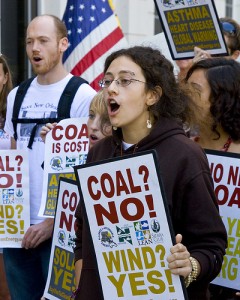Americans Say 'Yes' to Clean Energy, 'No' To Fracking Without Safeguards
 Fossil fuel companies and their political allies have spent millions of dollars on advertising to persuade Americans that drilling and mining are the best solutions to our energy problems. Despite their spending, these polluters haven’t convinced most Americans – including many Republicans — to support their proposals.
Fossil fuel companies and their political allies have spent millions of dollars on advertising to persuade Americans that drilling and mining are the best solutions to our energy problems. Despite their spending, these polluters haven’t convinced most Americans – including many Republicans — to support their proposals.A brand new United Technologies/National Journal Congressional Connection Poll found overwhelming public support for renewable energy tax credits, a clean energy standard, and increased regulation of hydraulic fracking for oil and gas production.
The nationwide poll of 1,004 adults was conducted from May 17-20. It asked respondents about whether tax credits for renewable energy — such as the Production Tax Credit for wind set to expire the end of this year — should be extended:
Supporters of these tax credits say they should be extended because they create jobs and encourage the development of cleaner sources of energy. Opponents say they should end because they cost too much and have not been effective at encouraging the use of renewable energy. Do you think Congress should extend these energy credits, OR allow them to expire?
By better than a two to one margin, respondents wanted to extend the incentives. Independents favored such an extension by 64 to 29 percent, as did 48 percent of Republicans. Only 43 percent of Republicans opposed the PTC extension.
Today, President Obama plans to visit TPI Composites, a manufacturer of wind turbine blades in Newton, Iowa that employs 700 people. He is expected to again urge Congress to extend the PTC because it is vital for job creation and maintaining competitiveness in the wind energy industry. The National Journal poll suggests that most Americans agree with him.
Poll respondents demonstrated additional strong support for clean energy when they were asked about whether they favored a Clean Energy Standard that would require utilities to generate 80 percent of their electricity with low- or no carbon resources by 2035.
Legislation recently introduced in the U.S. Senate would create a national clean-energy standard that requires the country to generate an increasingly large percentage of its electricity from cleaner sources of energy, including renewable energy, natural gas, and nuclear power. Supporters of this policy say it would promote cleaner energy and not add an undue cost onto consumers. Opponents say imposing a national clean-energy standard would cost jobs and create higher electricity costs. What is your opinion – do you think the country should or should NOT create a national clean-energy standard?
The National Journal poll found that supporters outnumbered opponents by nearly 40 percent. This included independents who favored it by 64 to 23 percent. Even Republicans favored a Clean Energy Standard by one percent.
Fossil fuel interests are spending millions of dollars advertising and lobbying to convince Congress to leave hydraulic fracturing unregulated — despite its production of large amounts of air, water, and climate pollution. So far, it appears Big Oil has made little progress convincing the public to support their position. Respondents were asked:
Hydraulic fracturing or “fracking” is a process used to develop deposits of natural gas recently discovered in many regions of America. Environmentalists and some residents living near drilling operations worry that fracking can contaminate drinking water sources and worsen climate change. The oil and natural gas industry maintains the process is safe and can create jobs and promote energy independence. Which of the following comes closest to your view of what the federal government should do on this issue?
One of six respondents wanted to “ban fracking altogether because it’s not safe for the environment.” A majority supported an “increase in regulation of fracking to protect the environment, but NOT ban it.” A total of sixty eight percent wanted either a ban or more safeguards from fracking. Only one quarter of poll subjects wanted to “reduce regulation of fracking to encourage more natural gas production.”
Some 68 percent of independents wanted to ban or regulate fracking. A clear majority of Republicans wanted either a ban or more regulation. Only 41 percent of GOPers wanted to reduce regulation.
The National Journal poll is independent of both political parties, and provided respondents with arguments for and against each position. By overwhelming margins – including a majority or plurality of Republicans – respondents supported clean energy investments, clean energy targets, and cleaning up hydraulic fracking.
The poll suggests that people are disregarding the tens of millions of dollars in attack ads against clean energy spent by Big Oil, the dirty coal lobby, the Koch Brothers, and Mitt Romney’s oil-funded super PAC. Perhaps it’s because these ads had little credibility. The Washington Post concluded that “there is no excuse for these kinds of ads, which take facts out of context or simply invent them.”
This latest poll is another signal that 2012 candidates running for president, city council, or any other office should support clean energy and cleaner oil and gas production knowing that the public strongly favors these measures too.
You can return to the main Market News page, or press the Back button on your browser.

